UK Gambling Commission Chief Executive Andrew Rhodes has penned an open letter to warn gambling stakeholders about the misrepresentation of gambling statistics.
Rhodes began by noting that “there are a wide range of opinions on the subject and they sometimes differ very greatly and can be equally strongly held”.
He added: “Sometimes this can boil over into personal comments and even conspiracy theories as to what a given group, organisation or individual is believed to be seeking.”
The UKGC’s pressing concern, however, is that they have seen a “significant increase in the misuse of statistics around gambling as different parties seek to make persuasive arguments for or against different proposals.”
The Chief Executive labelled this as an “unacceptable” strategy being used by a variety of groups with gambling interests, including operators, trade bodies, charities, media outlets, sporting venue owners and others.
“Problem gambling and gambling-related harm are two separate, but linked, experiences”
Interested parties regularly cited statistics as they waited two years for the UK government to review the Gambling Act, which culminated in the publication of the white paper earlier this year in April.
With the first round of consultations now underway, the UKGC has stated that a “common misuse of statistics in recent months has been regarding the rate of problem gambling in Great Britain, and the conflation of problem gambling and gambling-related harm.”
Rhodes said in the communication: “Problem gambling and gambling-related harm are two separate, but linked, experiences.”
The UKGC is particularly frustrated by the use of Problem Gambling Severity Index data to make evaluations about gambling-related harm in the UK and create “an inaccurate picture”.
Rhodes highlighted statements that have misused statistics such as “99.7 per cent of people who gamble do so without being harmed” and “only 0.3 per cent of gamblers are harmed”.
“This is a percentage of the whole adult population in Great Britain and not of solely those who gamble as many have tried to suggest,” he stated.
Rhodes also spotlighted the misuse of data from the Health Survey for England 2021, which indicates that of those who gambled within the past year, 0.8 per cent experienced problem gambling.
Additionally, the 0.3 per cent figure does not account for those ‘at risk’ from gambling harm. 1.2 per cent of people who have gambled in the past year are at moderate risk and four per cent at low risk.
“The debate around gambling is often a fierce one, but nobody is well-served by statistics being misused”
The Chief Executive added that assumptions that some types of gambling are “less risky” are incorrect and misleading. Problem gambling rates differ by activity – 0.9 per cent of National Lottery players, 2.8 per cent of offline horse racing bettors, and 8.5 per cent of online slots, casino, or bingo players show signs of problem gambling.
Rhodes stated that the problem gambling rate “overall is low” compared to participation in the activity, but “beneath the surface of those numbers the picture is more complicated”, so data must be understood and used properly within the proper context of how it was collected.
He concluded: “Even with a relatively low proportion of people experiencing problem gambling we must remember that this can and does have catastrophic consequences and equates to hundreds of thousands of people directly affected and a greater number amongst friends, families and others.
“The debate around gambling is often a fierce one, but nobody is well-served by statistics being misused to further an argument.
“I therefore ask anyone commenting on this area to take a greater degree of care to ensure they are using evidence and statistics correctly, accurately and in the proper context and with any necessary caveats applied.”












